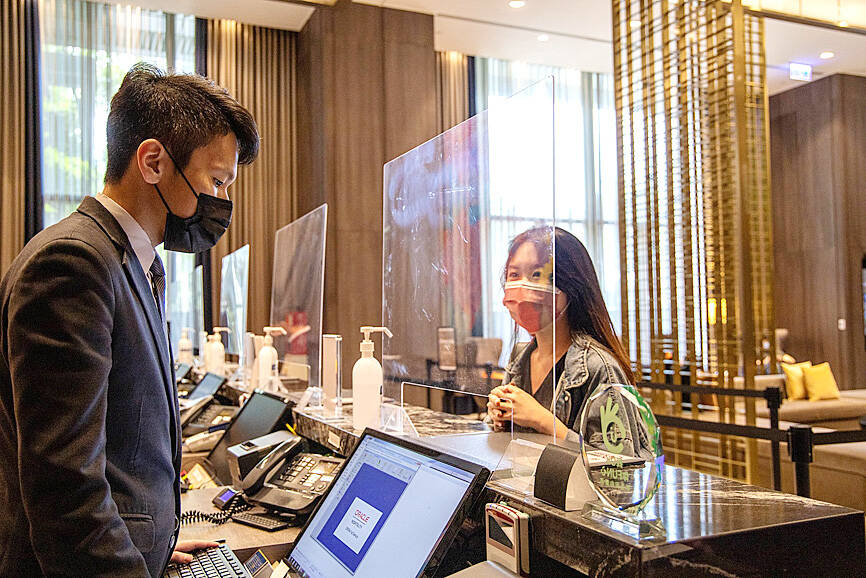Starting from today, international students and overseas Chinese students as well as those from Hong Kong and Macau can work as fulltime housekeeping staff, receptionists and waiters in the hotel and lodging industry, the Ministry of Labor said yesterday.
The new policy is being implemented to address labor shortages in the hotel and lodging industry in the post-COVID-19 pandemic era, particularly as workers are needed for housekeeping, cleaning, booking and reception, as well as hotel dining areas, the Workforce Development Administration said in a statement.
Hoteliers and bed-and-breakfast operators that have certificates issued by the Tourism Administration and local governments can file applications to recruit international students and overseas Chinese students, as well as those from Hong Kong and Macau to fill mid-level jobs, it said.

Photo courtesy of the New Taipei City Government
The number of overseas Chinese students and international students that hoteliers are allowed to hire must not exceed 30 percent of the workforce covered by labor insurance, it added.
The students must have at least an associate’s degree and have undertaken at least 80 hours of internships provided by universities, colleges, the Tourism Administration and other tourism associations to qualify for the program, it said.
The starting salary for qualified students in the program would be NT$30,000 per month, which would be raised to NT$33,000 if their contracts are renewed.
The agency added that it would work with other government agencies to propose amendments to related regulations and establish a work permit system for the students. Such a system would make it possible for more of them to be recruited to replenish the workforce in other sectors such as healthcare, cargo transportation, and the logistics and warehousing industries, as well as the highway and city bus systems, the administration said.
“We will work with the National Development Council, the Ministry of Health and Welfare and the Ministry of Transportation and Communications to jointly evaluate how to use these students more effectively to address the labor shortage problem,” it said.
It said the students can apply for a work permit in accordance with regulations during their studies and use their spare time to work in Taiwan. The maximum number of working hours per week is 20 hours, but there is no limit on the number of working hours during the winter and summer vacations. Meanwhile, employers still need to abide by the working hour regulations of the Labor Standards Act when hiring overseas students.
The Regulations Regarding Study and Counseling Assistance for Overseas Chinese Students in Taiwan (僑生回國就學及輔導辦法), which is enforced by the Ministry of Education, defines “overseas Chinese students” as students of Chinese descent who come to Taiwan to study, who were born and lived overseas until the present time, or who have been living overseas for six or more consecutive years in the immediate past and obtained permanent or long-term residency status overseas.

‘ABUSE OF POWER’: Lee Chun-yi allegedly used a Control Yuan vehicle to transport his dog to a pet grooming salon and take his wife to restaurants, media reports said Control Yuan Secretary-General Lee Chun-yi (李俊俋) resigned on Sunday night, admitting that he had misused a government vehicle, as reported by the media. Control Yuan Vice President Lee Hung-chun (李鴻鈞) yesterday apologized to the public over the issue. The watchdog body would follow up on similar accusations made by the Chinese Nationalist Party (KMT) and would investigate the alleged misuse of government vehicles by three other Control Yuan members: Su Li-chiung (蘇麗瓊), Lin Yu-jung (林郁容) and Wang Jung-chang (王榮璋), Lee Hung-chun said. Lee Chun-yi in a statement apologized for using a Control Yuan vehicle to transport his dog to a

Taiwan yesterday denied Chinese allegations that its military was behind a cyberattack on a technology company in Guangzhou, after city authorities issued warrants for 20 suspects. The Guangzhou Municipal Public Security Bureau earlier yesterday issued warrants for 20 people it identified as members of the Information, Communications and Electronic Force Command (ICEFCOM). The bureau alleged they were behind a May 20 cyberattack targeting the backend system of a self-service facility at the company. “ICEFCOM, under Taiwan’s ruling Democratic Progressive Party, directed the illegal attack,” the warrant says. The bureau placed a bounty of 10,000 yuan (US$1,392) on each of the 20 people named in

INDO-PACIFIC REGION: Royal Navy ships exercise the right of freedom of navigation, including in the Taiwan Strait and South China Sea, the UK’s Tony Radakin told a summit Freedom of navigation in the Indo-Pacific region is as important as it is in the English Channel, British Chief of the Defence Staff Admiral Tony Radakin said at a summit in Singapore on Saturday. The remark came as the British Royal Navy’s flagship aircraft carrier, the HMS Prince of Wales, is on an eight-month deployment to the Indo-Pacific region as head of an international carrier strike group. “Upholding the UN Convention on the Law of the Sea, and with it, the principles of the freedom of navigation, in this part of the world matters to us just as it matters in the

The High Court yesterday found a New Taipei City woman guilty of charges related to helping Beijing secure surrender agreements from military service members. Lee Huei-hsin (李慧馨) was sentenced to six years and eight months in prison for breaching the National Security Act (國家安全法), making illegal compacts with government employees and bribery, the court said. The verdict is final. Lee, the manager of a temple in the city’s Lujhou District (蘆洲), was accused of arranging for eight service members to make surrender pledges to the Chinese People’s Liberation Army in exchange for money, the court said. The pledges, which required them to provide identification